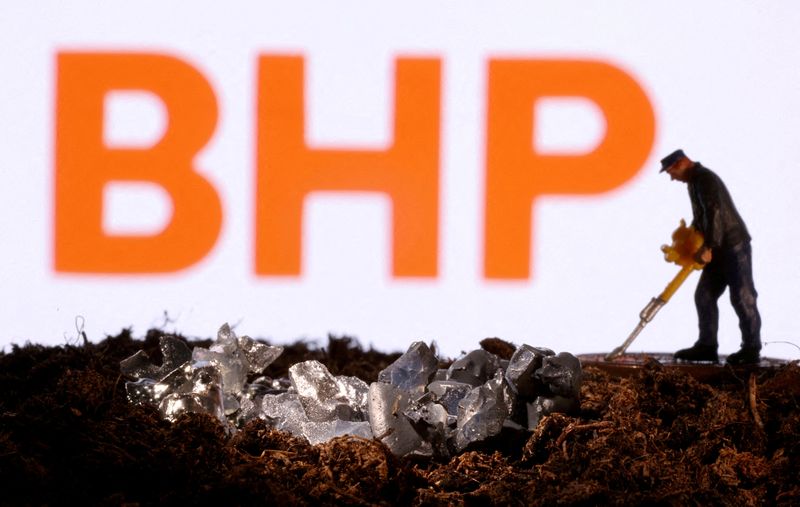BHP’s exploration accelerator to open to uranium, lithium finds
2023.04.05 00:54

© Reuters. FILE PHOTO: A small figure and mineral imitation are seen in front of the BHP logo in this illustration taken November 19, 2021. REUTERS/Dado Ruvic/Illustration
SINGAPORE (Reuters) – BHP Group (NYSE:)’s programme to support promising minerals explorers will expand beyond and nickel to prospective uranium and lithium projects from September, the head of its Xplor program said on Wednesday.
The Xplor accelerator program chose seven projects around the world to support for six months from January in its first year this year that fit with BHP’s portfolio – copper and nickel – and are key to the energy transition.
BHP expects the world to need twice the amount of copper by 2030 as is produced this year, and four times the amount of nickel.
For its second year, the programme wants to receive double the number of applications at 500 from the first year as it opens up to more commodities, said Sonia Scarselli, vice president of BHP Xplor.
“We will be looking not just at copper and nickel, but at uranium and lithium and so on,” Scarselli told a commodities conference in Singapore.
The Xplor program has been successful as it offers financial and strategic support to minerals explorers and helps them with connections, while BHP gains exposure to new ideas and geological deposits that may struggle to access bank funding because they are too novel or early stage, she said.
BHP has provided $500,000 each to Nordic Nickel, Tutume Metals, Asian Battery Minerals, Impact Minerals, Red Ox Copper, Bronzite Corp and Kingsrose Mining.
The industry in general is suffering from a decade of underinvestment in exploration and must hurry to catch up if it is to meet the demand challenges of decarbonisation, she said.
Scarselli told Reuters last month BHP saw lithium’s demand-supply equation as not as fundamentally stretched as that for copper and nickel.
BHP CEO Mike Henry has maintained that the world’s biggest miner has no appetite for lithium, because its relative abundance made it impossible to gain a strategic position in a long-life, low-cost deposit.
The miner, which produces uranium as a byproduct at its Olympic Dam copper operations in South Australia, has become more vocal about the role of uranium in a new energy world.








